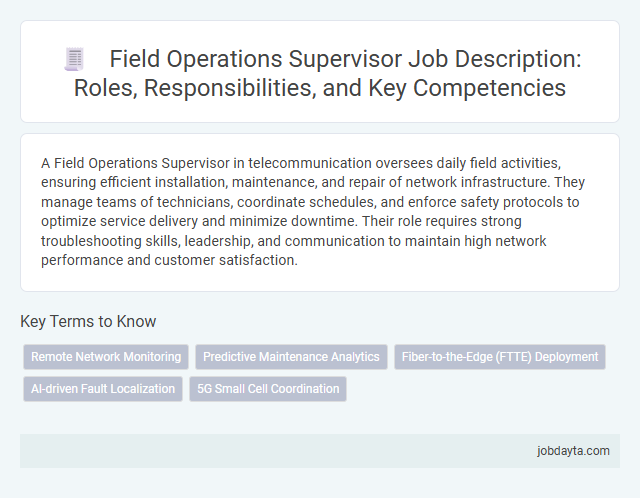A Field Operations Supervisor in telecommunication oversees daily field activities, ensuring efficient installation, maintenance, and repair of network infrastructure. They manage teams of technicians, coordinate schedules, and enforce safety protocols to optimize service delivery and minimize downtime. Their role requires strong troubleshooting skills, leadership, and communication to maintain high network performance and customer satisfaction.
Overview of a Field Operations Supervisor in Telecommunications
What does a Field Operations Supervisor in telecommunications do? A Field Operations Supervisor ensures efficient management of field technicians and oversees the installation, maintenance, and repair of telecom infrastructure. You play a critical role in coordinating field activities to maintain network reliability and customer satisfaction.
Essential Roles and Duties in Field Operations Management
| Role | Field Operations Supervisor |
|---|---|
| Industry | Telecommunication |
| Essential Roles |
|
| Key Duties |
|
| Your Impact | Your leadership ensures efficient, safe, and high-quality telecommunications field operations, directly influencing customer satisfaction and network reliability. |
Key Responsibilities of a Telecommunications Field Operations Supervisor
A Telecommunications Field Operations Supervisor manages on-site teams to ensure seamless installation, maintenance, and repair of telecom infrastructure. You oversee daily field activities, ensuring compliance with safety standards and project timelines.
The role involves coordinating with multiple departments to optimize resource allocation and monitor field performance metrics. Supervisors troubleshoot technical issues and provide guidance to technicians, ensuring high-quality service delivery.
Skills and Competencies Required for Effective Field Supervision
Effective field supervision in telecommunications demands a unique blend of technical knowledge and leadership abilities. A Field Operations Supervisor ensures seamless coordination and high-quality service delivery across field teams.
- Technical Proficiency - In-depth understanding of telecommunication networks, equipment, and troubleshooting techniques is essential to guide field technicians effectively.
- Leadership and Team Management - Ability to motivate, train, and manage diverse teams while maintaining productivity and morale on-site.
- Problem-solving Skills - Quick identification and resolution of operational challenges to minimize downtime and ensure service continuity.
Mastering these skills enables a Field Operations Supervisor to optimize field activities and enhance overall network performance.
Managing Field Teams: Leadership and Communication Strategies
Field Operations Supervisors play a critical role in managing telecommunication field teams by setting clear objectives and ensuring efficient task allocation. Effective leadership involves fostering open communication channels to quickly address issues and maintain team morale. Your ability to implement strong communication strategies directly impacts project success and operational efficiency.
Safety and Compliance in Telecommunications Field Operations
Field Operations Supervisors play a critical role in ensuring safety and compliance within telecommunications field operations. Their leadership guarantees adherence to industry regulations and minimizes risks on-site.
Maintaining strict compliance with safety standards protects your team and infrastructure from accidents and regulatory penalties. Supervisors implement regular training and conduct thorough inspections to uphold operational integrity. Effective safety management drives efficiency and supports sustainable telecommunications services.
Problem-Solving and Decision-Making in the Field
Field Operations Supervisors in telecommunications play a critical role in resolving complex technical issues on-site. Rapid problem-solving ensures minimal service disruption and maintains customer satisfaction.
Effective decision-making in the field requires analyzing data from network performance and equipment status. Your ability to assess situations quickly leads to efficient repairs and optimized network functionality.
Tools and Technologies Utilized by Field Operations Supervisors
Field Operations Supervisors in telecommunications manage on-site teams to ensure efficient network maintenance and installation. They rely heavily on advanced tools and technologies to optimize fieldwork and maintain service quality.
- Geographic Information Systems (GIS) - Enables precise mapping and asset tracking for effective field resource allocation.
- Mobile Workforce Management Software - Facilitates real-time scheduling, dispatching, and communication with field technicians.
- Network Diagnostic Tools - Allows supervisors to remotely monitor network performance and troubleshoot issues promptly.
Performance Metrics and Reporting in Field Operations
The Field Operations Supervisor plays a critical role in managing and optimizing performance metrics to ensure efficient telecommunication field activities. Monitoring key performance indicators such as response times, task completion rates, and service quality helps drive operational excellence. Detailed reporting provides insights that support decision-making and continuous improvement in field operations.
Career Path and Professional Development for Field Operations Supervisors
Field Operations Supervisors play a crucial role in managing telecommunication field teams and ensuring efficient service delivery. Career growth in this role involves advancing technical skills and leadership capabilities.
- Entry-Level Technician Experience - Gaining hands-on knowledge with telecom infrastructure lays the foundation for supervisory roles.
- Leadership Training - Developing managerial skills prepares you for overseeing field operations and coordinating teams effectively.
- Advanced Certifications - Obtaining industry certifications such as Certified Telecommunications Network Specialist enhances professional credentials and career opportunities.
Related Important Terms
Remote Network Monitoring
A Field Operations Supervisor in telecommunication specializes in remote network monitoring to ensure optimal performance and rapid fault detection across distributed infrastructure. Leveraging advanced network management systems and real-time analytics, they coordinate field teams to implement timely maintenance and minimize service disruptions.
Predictive Maintenance Analytics
A Field Operations Supervisor leverages predictive maintenance analytics to minimize equipment downtime and optimize network performance by analyzing real-time data from telecommunications infrastructure. Using advanced machine learning algorithms, they identify potential failures before they occur, ensuring proactive maintenance and reducing operational costs.
Fiber-to-the-Edge (FTTE) Deployment
Field Operations Supervisors in Fiber-to-the-Edge (FTTE) deployment coordinate on-site installation teams, ensuring adherence to project timelines and quality standards while managing fiber optic network expansions. Expertise in fiber splicing, network testing, and real-time troubleshooting is essential to optimize network performance and reduce service disruptions.
AI-driven Fault Localization
Field Operations Supervisors leverage AI-driven fault localization to rapidly identify and resolve network issues, improving uptime and reducing operational costs. Advanced machine learning algorithms analyze real-time data from telecommunications infrastructure, enabling predictive maintenance and minimizing service disruptions.
5G Small Cell Coordination
A Field Operations Supervisor specializing in 5G Small Cell Coordination manages site surveys, equipment installation, and network optimization to ensure seamless 5G coverage and performance. They coordinate with engineering teams, vendors, and local authorities to streamline deployment, reduce downtime, and meet project deadlines in telecommunication infrastructure.
Field Operations Supervisor Infographic

 jobdayta.com
jobdayta.com